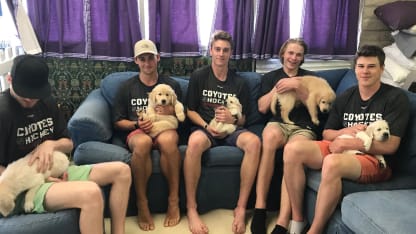Galante, along with Power Paws Chief Development Officer Elaine Starks and the rest of the Power Paws staff, were proud to welcome a group of five Coyotes prospects to their puppy-training headquarters on Wednesday morning during Arizona's development camp. Prospects Erik Walli Walterholm, Max Gerlach, Patrick Kudla, Dean Stewart and Adam Marsh spent the morning getting to know two litters of puppies - some three weeks old, some six weeks old - all of which will soon begin training to become certified assistance dogs.
"It's different - you don't expect to be coming to play with puppies when you come to development camp," said Kudla with a laugh. "I've never seen two stages of puppies in one room, so that's pretty cool. Just holding the little puppies is awesome."
None of the five prospects who visited Power Paws are based in the Phoenix area. But that didn't stop them from inquiring about how to become a volunteer. A whopping 3,000 good Samaritans report to Power Paws daily, weekly, or monthly for a variety of duties, as minimal as puppy petting or as intensive as puppy raising.
"Our puppy raisers volunteer two years of their life, and they dedicate that time and the money - it's about $2,000 out of pocket for the raisers - to a dog that they are going to then give away to somebody who needs it," Galante said. "So they are very much committed, and it's very touching. It's very much like a family."
At the conclusion of those two years, Power Paws holds a graduation ceremony in which the puppy raisers pass the torches - or the leashes, in this case - to disabled recipients who require canine assistance.
"It's really wonderful," Galante said, "and it's heartwarming."
It is clear that Power Paws is proud of its relationship with the local hockey club. In turn, the Coyotes' soft spot for organizations like Power Paws is no coincidence: Winger Max Domi manages Type 1 diabetes, and his service dog, Orion, helps him stay healthy.
"Part of our mission is doing some education about people with disabilities, and disabilities in general," Galante said. "For me, personally, it's about understanding what (Domi) is going through and being able to reach a broader audience and help people understand how important these dogs are."
For prospects like Kudla - who spend much of development camp on the ice, undergoing a series of performance evaluations and learning what it takes to become a pro - a trip to Power Paws was a welcome respite. And not only because it offered a chance to relax in the company of two-dozen puppies.
"Chemistry's huge in hockey," Kudla said. "So coming to a camp like this and not really knowing many guys, just coming to do something like this - something fun, something to laugh about and talk about after - is awesome."













